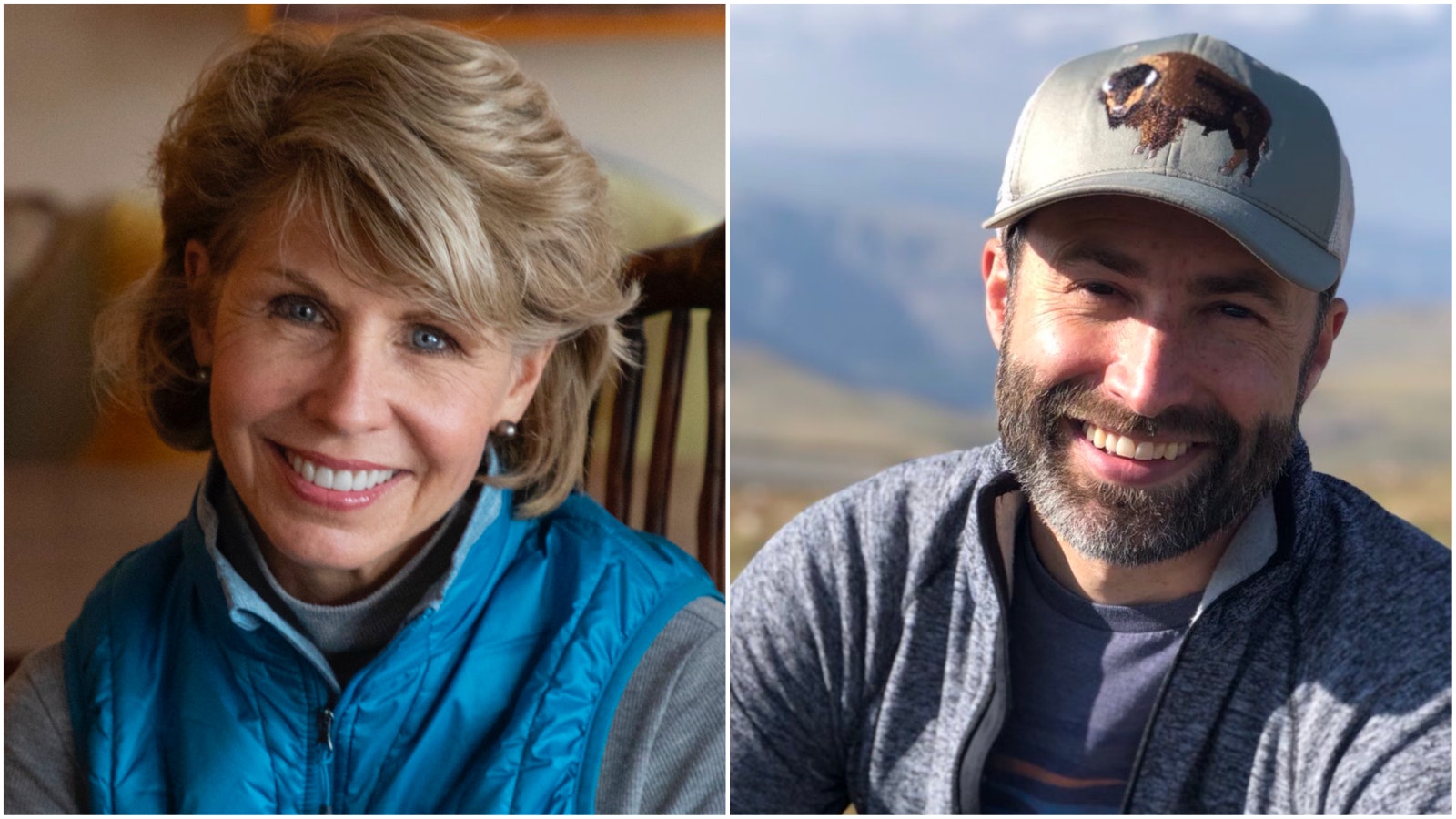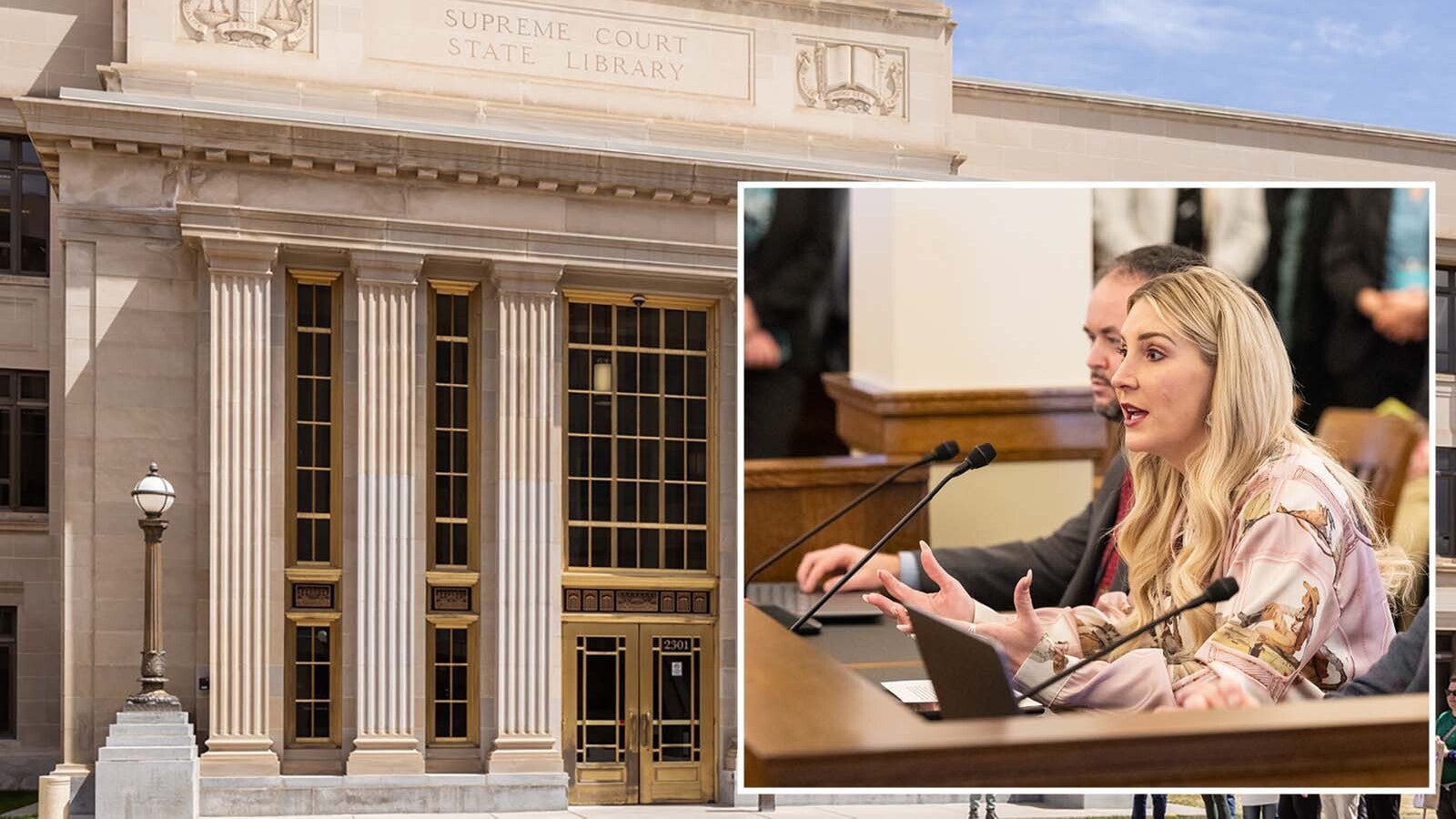In one of Wyoming’s most progressive House districts, a race has emerged between an established policy mind and a younger, up-and-coming challenger looking to flip the status quo in Wyoming upside down.
Democrats Liz Storer and Ryan Sedgeley are competing to represent Wyoming House District 23 in this year’s primary election. The district covers the northern portion of the town of Jackson and Teton County, Grand Teton National Park and the southern half of Yellowstone National Park.
For the last 14 years, Storer has led the George B. Storer Foundation, which invests in nonprofits and programs throughout the state. The foundation supports nonprofit journalism entities WyoFile, Wyoming Public Media and High Country News, University of Wyoming scholarships, and protecting sage grouse habitat and other projects.
The Candidates
Storer, a Jackson resident, has been lobbying at the State Capitol since 1994 for various environmental causes, which she said has given her a strong understanding for policy issues affecting the state.
“I have a deep love and respect for Wyoming,” Storer said. “I am concerned about its future.”
Storer said she is the only candidate in the race with policy experience. Although Sedgeley said he has some recent policy experience, he admits he does not possess as much as Storer.
“Every opportunity this state has to move into the 21st century, it keeps going back to the past and shooting itself in the foot,” he said. “This state has every opportunity to diversify. Republicans are strangling the state.”
Sedgeley lives at Old Faithful within Yellowstone National Park and works for the Wyoming Outdoor Council. He is proud of his blue-collar roots, which taught him the need to work to put food on the table. After working as a valve mechanic at a nuclear power plant, Sedgeley went on to get a law degree from the University of Wyoming.
“I’m tired of seeing things not getting done in my region,” he said. “There are things being done that are really harming people.”
Both candidates are looking to replace Rep. Andy Schwartz, R-Jackson, who is not running for reelection. The winner of the Aug. 16 primary will take on Republican Paul Vogelheim in the general election, who is running unopposed in his primary.
Anti-Fossil Fuels
Sedgeley, a Teton County Democratic Party committeeman, wants all coal production in Wyoming and plans to develop the nuclear plant in Kemmerer immediately stopped.
He said money could be used from the state’s permanent mineral trust fund to pay full salaries for the employees who would be laid off in these industries, who then could be trained to work green energy jobs.
“We need to think big,” he said. “In Wyoming, we are in an unmatched position where we would be climate change heroes, heroes for ending carbon emissions.”
Storer and Sedgeley want Wyoming to move away from its dependence on fossil fuel revenue with a new approach. Storer wants the state to adopt a new tax policy and study how climate change could affect the state’s wildlife and its farmers.
“Wyoming is at a crossroads as it strives to build a new economy that does not rely on the extraction of fossil fuels but many in leadership today only want to look in the rearview mirror,” Storer said, adding making changes now will be much easier than waiting to do so at some point in the future.
Market Solutions Not Enough
She said the state has become increasingly reliant on Teton County for revenue as a major tourism hub and would like the county to have more control over its future at the state level.
Teton County has had a housing shortage for quite some time, but over the last few years many other parts of the state have started seeing a similar problem. Storer said she would like to see more public housing in Wyoming, where construction companies and communities could be rewarded for participating with an incentive-based program.
“Market solutions alone cannot solve the housing crisis and protect our environment and community character,” Storer said. “Government and philanthropy must work with the private sector to help incentivize and or subsidize affordable housing.”
Increase Taxes
To help address this and other economic-related problems, Storer wants Wyoming to establish a more equitable tax structure that initiates a higher tax burden on the state’s wealthiest residents and expands sources of revenue beyond a primary reliance on fossil fuels.
“No one is paying their fair share of taxes, other than the energy industry,” she said, mentioning how Wyoming has the 10th most unequal tax policy according to the Institute on Taxation and Economic Policy, with the lowest 20% earners paying the highest taxes.
“We have no real estate tax, no gift tax, a very low tobacco and alcohol tax, our sales tax rate is very low,” Storer said.
She said the state’s low tax rates have led to an influx of new residents looking to take advantage of the savings.
“I don’t know if that was the case 10 years ago,” she said. “It doesn’t serve the state as well when the people moving to the state serve 10% of the services they demand.”
Storer also wants to expand the state’s property tax rebate program to a wider range of constituents but does not want to lower the state’s property tax rate, which she considers “quite modest.”
Sedgeley wants property tax rates increased on residents with multiple homes in the state, a budding trend with the growth of vacation rental companies like Airbnb.
“If they’re not living here they probably can afford to pay higher taxes,” he said. “If they don’t want to do that- great, then we’ll have people who actually live here and want to be part of the community.”
Curt Meier Criticism
Storer criticized State Treasurer Curt Meier’s handling of the state’s investment funds and said the state needs to look at new industries for better returns.
“We have a portfolio that looks like 1968,” she said.
Storer said with even a 2% growth to the state’s $29 billion in investments, Wyoming could bring in $580 million in additional revenue.
Wyoming has some of the most private financial trust laws in the nation, a topic of particular importance in the highly affluent Teton County. Storer said these laws have been abused by bad actors for ill-gotten gains and she wants to study how they can be improved.
Sedgeley wants to take more immediate action, saying all loopholes need to be closed on blind trusts.
“It encourages money laundering,” he said. “We have billionaires who need to pay those taxes. If they want to pay they can stay, if they don’t they should leave.”
Sedgeley said corner crossing should be legal in Wyoming and the State Legislature could address this issue by creating a constructive easement law.
“We can’t have isolated pieces of public land,” he said. “The courts intended for these to be public lands. If the public doesn’t have access, the private landowner is the only one with access to them and that’s not what we’re paying (taxes) for.”





